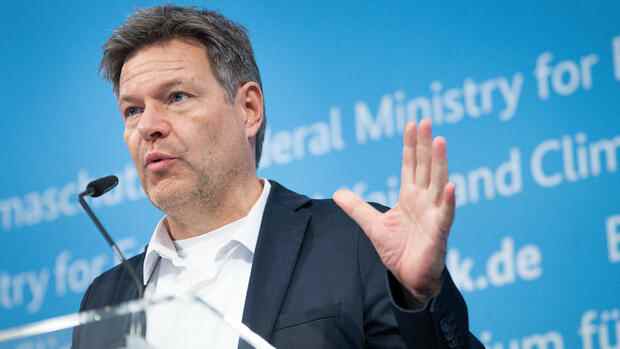The contracts should be the core of the industrial transformation and the ramp-up of hydrogen production.
(Photo: IMAGO/Political Moments)
Berlin Federal Minister of Economics Robert Habeck (Greens) wants to initiate the green industry turnaround with a multi-billion dollar funding concept after the energy turnaround. For example, energy-intensive sectors such as steel, chemicals or cement would initially convert their production to be climate-friendly, as shown by the draft guideline presented to the Reuters news agency on Wednesday.
Climate protection agreements are concluded with the industry on the basis of the directive: Those who make their production climate-friendly receive both money for investments and annual funds for the more expensive, green production within the framework of a 15-year contract between the state and the company. This involves the use of hydrogen, which is intended to displace coking coal, oil or natural gas.
The guideline states: “Climate protection agreements therefore not only lead to a reduction in emissions from the subsidized industry. They also provide an incentive for the technologies and infrastructure required for this to be developed and implemented in Germany now.”
State can also receive repayments
The contracts should be the core of the industrial transformation and the ramp-up of hydrogen production. Unlike cars in traffic or heat pumps in the building sector, industry often cannot convert its processes directly to green electricity.
Top jobs of the day
Find the best jobs now and
be notified by email.
Hydrogen is therefore considered an important energy source in the steel and chemical industries, for example. Experts from the “Agora” think tank had calculated that the German steel industry could, in the best-case scenario, become climate-neutral with around eight billion euros in aid.
>> Read here: This is how the emergency aid for gas and district heating works in December
According to the directive, the contracts should be put out to tender: Whoever asks for the least help, saves the most greenhouse gases and uses the least energy will be awarded the contract. Funds can also flow back to the state via the contract.
Since conventional production becomes more and more expensive over the years, for example due to the rising price of necessary CO2 pollution rights, repayments become due if the CO2 costs climb higher than the initially more expensive green production. Habeck’s draft is currently being coordinated with other departments. Habeck had announced the first contracts for early 2023.
More: Habeck: “No room for negotiation” on energy price brakes for industry
